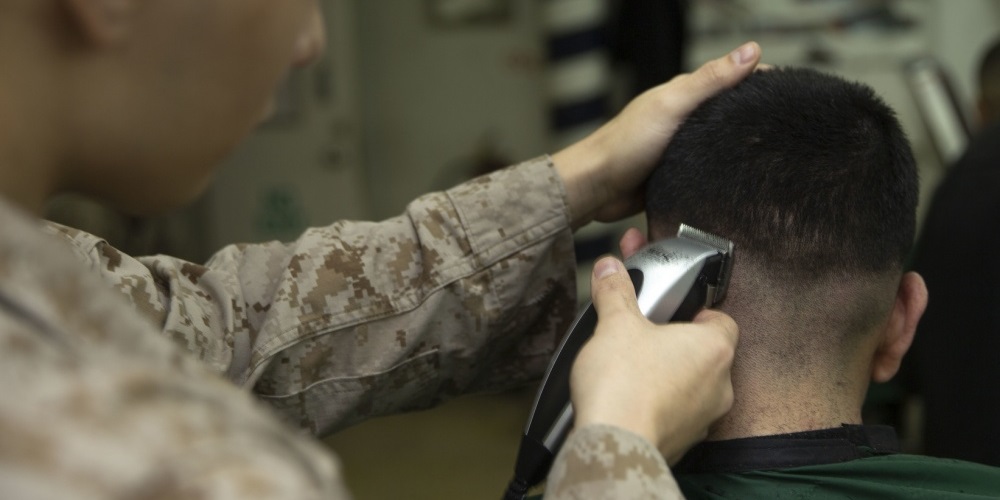

It’s pretty clear that the Marine Corps is tired of answering questions about why Marines are still required to get haircuts in the midst of the novel coronavirus (COVID-9) pandemic.
The controversy became a national news story this week video taken on April 5 was posted online showing Marines at Camp Pendleton, California, waiting in a line that snaked outside of a base barbershop. The Marines were not wearing masks, nor were they standing 6 feet apart. Social distancing precautions have been implemented since then.
A source at Camp Pendleton sent me this footage of Marines lined up at a base barbershop because grooming standards trump all else apparently https://t.co/awQHjhzR4K pic.twitter.com/3aCrww3JK2
— Jared Keller (@jaredbkeller) April 13, 2020
Do not expect any further guidance from Marine Corps Commandant Gen. David Berger on this issue, even though a spokeswoman for Marine Corps Installations-West deferred to the commandant when Task & Purpose asked why Marines at Camp Pendleton were still required to visit the barbershop.
“All grooming standards and potential modifications come from the commandant,” 2nd Lt. Charlotte Dennis said on April 14. “This is why barber shops are open on installations throughout the Marine Corps.”
Berger’s spokesman Col. Ricardo Player has provided Task & Purpose what the Corps hopes to be the final word on the haircut debate.
Q. Even with social distancing, Marines are still at risk of getting COVID-19 when they go to the barbershop. Wouldn’t it be safer for Marines if Gen. Berger announced that all requirements for Marines to get haircuts were suspended until the COVID-19 pandemic is under control?
We must all remain vigilant, doing our part in slowing the spread of the virus. Proper personal hygiene, hand washing, mask wear and keeping your hands away from your face are personal measures we can take.
Also, businesses can ensure the safety of customers by enforcing proper social distancing, cleaning equipment and sanitizing public areas. Headquarters Marine Corps trusts its leaders to implement appropriate and additional precautionary health protection measures, and we’ve given them the latitude to waive requirements where it’s not practical to meet restrictions.
Q. Defense Secretary Esper indicated on Tuesday that either he or Gen. Mark Milley would raise the possibility of suspending haircut requirements with Gen. Berger. Has such a conversation taken place? If so, what was the result?
If that personal discussion occurred, I will not violate that protected engagement.
U.S. Defense Secretary Mark Esper and General Mark Milley seemed to disagree on whether Marines should still get haircuts despite social distancing guidelines pic.twitter.com/pQqOo0Supl
— Reuters (@Reuters) April 15, 2020
Q. Can Gen. Berger assure Marine commanders that they will not get into trouble if they decide to waive requirements for their Marines to get haircuts during the COVID-19 pandemic?
Gen. Berger has spoken with commanders, and made it clear in a white letter that commanders act with the preservation of the force at the forefront of their decision-making. Given these unprecedented times, commanders who “articulated the why” and taken steps to relax grooming standards have not faced negative consequences.
Q. The majority of the sailors aboard the USS Theodore Roosevelt who have tested positive for COVID-19 are asymptomatic, Secretary Esper said on Thursday. How can commanders decide whether Marines are healthy enough to gather with other Marines in barbershops if they could be carrying COVID-19 but not showing any symptoms?
Marines, healthy, sick or otherwise, are not expected to gather in any setting unless to execute their assigned mission, and with proper social distancing and mitigation measures. Marines are expected to follow mitigations measures in accordance to CDC, DOD and USMC guidance.
Q. What would be the impact on readiness if the Marine Corps relaxed grooming standards for all Marines?
Directives cannot account for all circumstances, and therefore, discretion must be used to apply risk-mitigation while accounting for the need for mission readiness. At this point, there have not been service-wide modifications to standards. Marines and commanders are expected to keep a high state of readiness.
Modifications to standards are taking place today across the world where Marines are located based upon the situation on the ground. Commanders will keep force preservation at the forefront of decision-making and the Marine Corps will continue to assess the need for changes to policies during this unprecedented global virus response.
